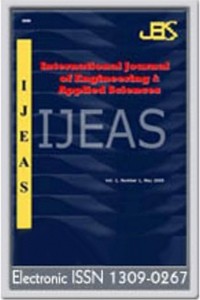Optimum Design of Composite Corrugated Web Beams Using Hunting Search Algorithm
Over the past few years there has been sustainable development in the steel and composite construction technology. One of the recent additions to such developments is the I-girders with corrugated web beams. The use of these new generation beams results in a range of benefits, including flexible, free internal spaces and reduced foundation costs. Corrugated web beams are built-up girders with a thin-walled, corrugated web and wide plate flanges. The thin corrugated web affords a significant weight reduction of these beams, compared with hot-rolled or welded ones. In this paper, optimum design of corrugated composite beams is presented. A recent stochastic optimization algorithm coded that is based on hunting search is used for obtaining the solution of the design problem. In the optimisation process, besides the thickness of concrete slab and studs, web height and thickness, distance between the peaks of the two curves, the width and thickness of flange are considered as design variables. The design constraints are respectively implemented from BS EN1993-1:2005 (Annex-D, Eurocode 3) BS-8110 and DIN 18-800 Teil-1. Furthermore, these selections are also carried out such that the design limitations are satisfied and the weight of the composite corrugated web beam is the minimum.
___
- [1] Elgaaly M, Hamilton RW ve Seshadri A, Shear Strength of Beams with Corrugated Webs, Journal of Structural Engi-neering (ASCE), 122, 4, 390-398, 1996. [2] Elgaaly M, Hamilton RW and Seshadri A, Bending Strength of Steel Beams with Corrugated Webs, Journal of Struc-tural Engineering (ASCE), 123, 6, 772-782, 1997. [3] Johnson RP ve Cafolla J, Local Flange Buckling in Plate Girders with Corrugated Webs, Structures and Buildings (ICE), 123, 148-156, 1998. [4] Li Y, Zhang W, Zhou Q, Qi X ve Widera GEO, Development and Research on H-beams with Wholly Corrugated Webs, Journal of Materials Processing Technology, 101, 1-3, 115-118, 2000. [5] Pasternak H ve Kubieniec G, Plate Girders with Corrugated Webs, Journal of Civil Engineering and Management, 16, 2, 166-171, 2010. [6] British Standards, BS 5950, Structural Use of Steelworks in Building, Part 1. Code of Practice for Design in Simple and Continuous construction, hot rolled sections, British Standard Institution, London, U.K., 2000. [7] DIN V ENV 1993-1-1, EUROCODE 3: Design of Steel Structures; Part 1- General Rules and rules for buildings. [8] DIN 18 800 Teil1-3, Stahbauten; Bemessung und Konstruktion. [9] British Standards, BS 8110, Structural Use of Concrete, Part 1. Code of Practice for Design and Construction, British Standard Institution, London, U.K. [10] Steelwork design Guide to BS 5950: Part 1, Section Properties, Member Capacities, Vol.1, 4th edition, The Steel Construction Institute, U.K., 1990. [11] F. Erdal, O. Tunca, S. Taş, (2016) “Experimental tests of optimally designed steel corrugated beams”, 2nd international conference on new advances in civil engineering (ICNACE 2016), Zagreb,Crotia. [12] Kirkpatrick, S., Gerlatt, C. D., Vecchi, M. P., Optimization by Simulated Annealing, Science, 220, 671-680, (1983). [13] Rechenberg I. Cybernetic solution path of an experimental problem. Royal aircraft establishment, library translation no. 1122. UK: Farnborough, Hants;1965. [14] Perez, R. E., Behdinan, K., Particle Swarm Approach for Structural Design Optimization, Computers and Structures, 85 (19-20), 1579-1588, 2007. [15] Glover F. Tabu search-part I. ORSA J Comput, 1(3):190–206, 1989. [16] Dorigo M, Stutzle T. Ant colony optimization a Bradford book. USA: Massachusetts Institute of Technology; 2004. [17] Lee K.S., Geem Z.W., A New Structural Optimization Method Based on the Harmony Search Algorithm, Computers and Structures, 82, 781-798, 2004. [18] Goldberg D.E., Genetic Algorithms in Search, Optimization and Machine Learning, Addison-Wesley Publishing, 1989. [19] Oftadeh ., Mahjoob MJ, Shariatpanahi M, A novel meta-heuristic optimization algorithm inspired by group hunting of animals: Hunting search, Computers and Mathematics with Applications, 60, 2087-2098, 2010. [20] X. S. Yang, (2008) Nature-Inspired Metaheuristic Algorithms, Luniver Press, UK.
- Başlangıç: 2009
- Yayıncı: Akdeniz Üniversitesi
